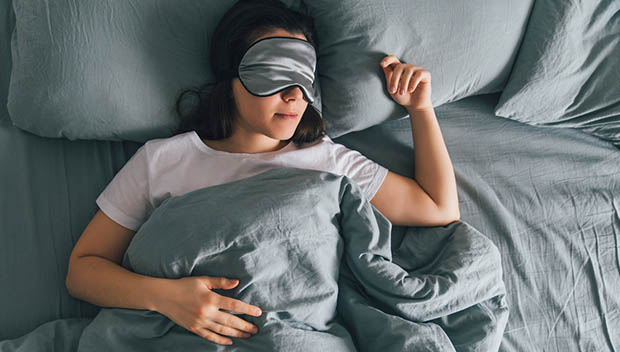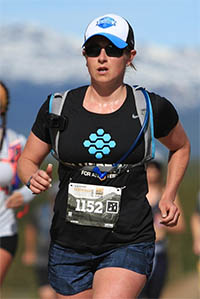
There is nothing better than a good night's sleep, the kind of slumber that you wake up from ready to attack the day. However, we have all had those nights where good sleep eluded us as we tossed and turned in bed and stared at the ceiling. When those nights become more common, they can affect your job, your family, and your training. In fact, sleep deprivation can cause a drop in sex drive, increased weight gain, and can lead to other health issues like depression over time. A study conducted in 2000 found that moderate sleep deprivation produces impairments equivalent to those of alcohol intoxication.
While the National Sleep Foundation recommends adults (ages 26 to 64) get seven to nine hours of sleep every night, we don't always hit that number. Sometimes it's just life—young kids, late nights, and early flights. Other times, small daily practices you may not notice can actually lead to bad sleep. These 13 habits might be keeping you from a restful night.
1. Late Night Snacks
Keeping your stomach up while you are trying to rest can disrupt your sleep. Stomach acid can creep up your throat when lying down, and your body will focus on breaking down the food instead of healing your body. If you need to eat before bed, keep it easy for your body to digest with a smoothie or soup.
2. Double Dipping in the Bedroom
Your bedroom should be a place of rest and relaxation. When we use beds to do work, play video games or even fold laundry, we are redefining that space to be active. Remove TVs, clutter, and extra lights from the room to encourage a mindset focused on relaxation. Keep food, work, and chores in the living areas of your home.
3. Sleeping at Irregular Times
During the week, it's usually easy to stay consistent with your morning and evening routines. These habits tend to loosen up on the weekends when staying out later and sleeping in. Disrupting these routines is the equivalent of taking a flight eastward every Friday and Sunday, and your body can treat it like jet lag. Try to closely align weekday and weekend sleep schedules when possible.
4. Sneaky Caffeine
How much caffeine do you think you have in a day? One cup of Joe in the morning? A pick-me-up in the afternoon? For those of you in training, there is hidden caffeine in everything, from workout drinks to soda to dark chocolate. According to the FDA, around 400 milligrams is a safe amount of caffeine for adults to consume daily. For reference, a grande Starbucks coffee is around 260 to 360 milligrams, depending on the roast. Caffeine can get into the bloodstream within 30 to 60 minutes and can stay there for three to five hours. Tally up the caffeine you consume on a daily basis, and you might be surprised. Try to scale back in the afternoons, and avoid it all together after 5 p.m.
5. Screen Scrolling
The devices that stay by your side all day should be put away at night or used with a blue light filter at a minimum. LED screens produce blue light, which suppresses the production of melatonin in the body, a hormone that regulates sleep. Give yourself a 30-minute buffer between screen-time and bedtime, and use the night filter for later scrolling. Put your phone on silent, face-down, and away from your head during sleep.
6. Letting Light In
The best sleep comes from complete darkness. The blue light from your TV, the bathroom light, or the neighbors' outdoor flood light beaming into your room all hurt your sleep. One solution is to hang blackout curtains to eliminate exterior light, turn off all switches in the house where light may leak under the bedroom door, and strategically hide any in-room light behind furniture or other objects. An easier solution is to wear an eye mask that puts you in complete darkness no matter where you are.
7. Warm Environment
Our bodies naturally cool as we wind down in the evening. A bedroom temperature should hover between 60 to 67 degrees Fahrenheit to help stimulate sleep. A cool sleep environment helps you fall asleep faster and stay in a deeper sleep longer.
8. Leaving on Accessories
You can keep your jammies on, but take off jewelry and remove contacts. Leaving on earrings, rings and necklaces can disrupt sleep when you roll over or try to get comfortable. And though some contacts are made to be slept in, they are still pieces of plastic in your eyes that can cause discomfort and pain. Lastly, remove hair ties from your wrist as they might cut off some circulation to your hands as you sleep.
9. Having a Nightcap
Though alcohol can have a calming, drowsy effect after it metabolizes, it can create a burst of energy as well. The National Institutes of Health found that drinking alcohol just before bedtime decreases the amount of time you spend in REM sleep (the deep sleep). This doesn't mean you should never drink before bed, but think about alternating nights or having it with dinner instead.
10. Eating Spicy Foods
A study in the International Journal of Psychophysiology found that subjects spent less time in both the light phase (Stage 2) and the deep phases (Stages 3 and 4) of sleep after eating spicy foods. Hold the hot sauce during dinner.
11. Your Daily Diet
If your diet is full of sugar, fried foods, and bubbly beverages, you might be hurting your sleep. High-sugar, high-carbohydrate, heavily-processed foods can spike your blood sugar. This leads to more energy and less sleep. Balance your diet with whole foods, leafy greens, and plenty of healthy fats and protein.
12. Staying in Bed
When you can't fall asleep, it seems normal to just lay in bed until you nod off. Experts recommend that you get out of bed and try to read, craft, or do another non-screen activity until you feel sleepy. Lying in bed can sometimes make the matter worse as you pursue a restful night.
13. Too Much Liquid
Drinking water throughout the day is great for your health. At night, limit tea or water intake so you don't have the urge to go to the bathroom in the middle of the night. For some, falling back asleep is difficult after waking up.
READ THIS NEXT: 17 Things Successful Runners Do Every Night


